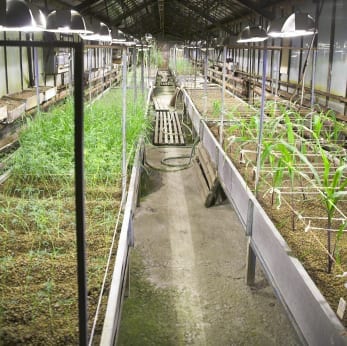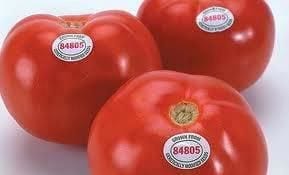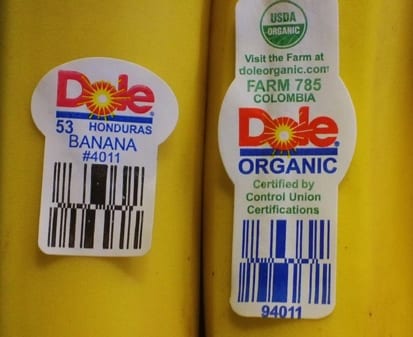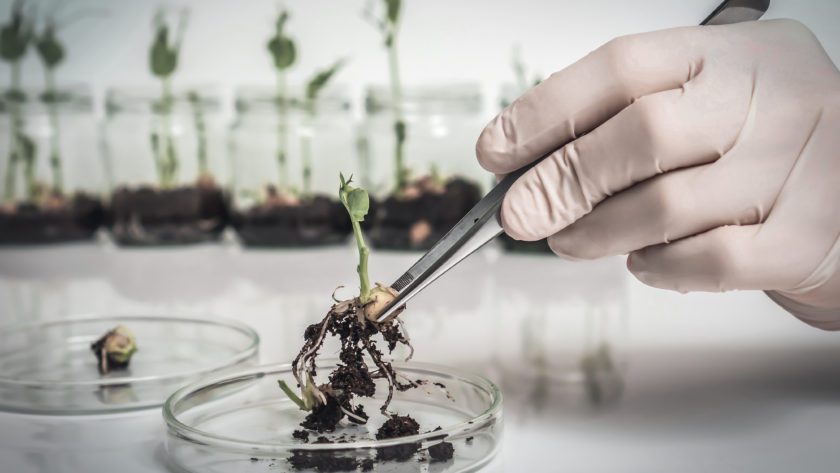GMO stands for genetically modified organisms which are specifically, genetically modified (GM) or ‘biotech’ crops, used to produce genetically modified foods.
These GM plants are created in a laboratory by altering their genetic material (DNA).
Scientists can introduce various modifications into the genes of crops, dairy products and animals.
So why and how do GMOs get into your food? Are they safe to eat? Here are some tips to avoid them if you choose to keep them off your plate.
How Crops Are Modified

Genetic modification (GM) is usually accomplished by adding one or more genes to a plant’s genome using genetic engineering techniques.
GMO foods are generated using various methods to transfer foreign cells into animals and plants, such as:
1) Gene guns (particle guns) which inject cells with genetic information, or
2) Bacterial carriers (a benign bacterial or viral infection).
Why Foods or Food Crops are Genetically Modified
Foods are modified to:
- Enhance taste and quality
- Improve nutritional content
- Improve resistance to pests, herbicides and disease
- Help conserve natural resources, i.e., they require less water or energy for processing (drought tolerant)
- Increase food supply
Are GMOs Safe to Eat?
No GM food can be guaranteed to be 100% safe, but current foods with only one gene added (most common) are considered “safe”.
However, the genetically-engineered food controversy continues with concern over the long-term effects to humans and to the environment and over the unpredictable dangers of interfering with nature.
The risks of GMO foods include:
- Introducing allergens and toxins to food
- Accidental contamination between GM and non-GM foods
- Antibiotic resistance
- Adversely changing the nutrient content of a crop
- Creation of “super” weeds and other environmental risks
Eating GMO and Not Knowing It
Many foods that you eat may contain GM organisms, but you may not be aware of it.
That’s because genetically-modified organisms are not only passed on to you in the crops you actually eat, but can be in the milk or beef you consume when cattle are fed a GM diet.
Also, experts say 60-70% of processed foods in the United States are made with GM ingredients, such as soybeans, maize, cotton, and rapeseed oil.
If you eat processed foods, such as breakfast cereals, snack foods, and sodas, it’s likely you’ve consumed some hidden GMO’s through the cottonseed and canola oils, corn or high fructose corn syrup they contain.
GMO Labeling
The U.S. is the largest producer of GM crops, but in the U.S. and Canada, food manufacturers are not required to label their GM food.
Genetically-modified food sold in Europe, however, must be labeled as such if 0.9% GMO.
Top 10 GM Foods
- Salmon
- Animal feed
- Oils
- Soybean (tofu and soy sauce are usually made from non-GM soybeans)
- Golden Rice
- Squash
- Tomatoes
- Corn
- Potatoes
- Sugar beets
Living Without GMO Foods
Avoiding GMO foods will require becoming familiar with common genetically-engineered plants and reading ingredient labels carefully since GM foods are prevalent in American grocery stores.
Become familiar with which products (and their derivatives) are most likely to be genetically modified.
By getting to know the most common applications of genetic engineering, you can avoid GMO foods if you choose. When shopping, look for the following:
- Non-GM or GMO-free label. Assume a food is GM unless labeled otherwise.
- 100% certified organic. Food labeled 100% organic cannot be genetically modified or have been fed GM food.

GMO labeling is NOT required. 5-digit PLU number beginning with an 8 which means it is genetically modified.
However, PLU (price look-up code) fruit and vegetable labeling is optional and GM foods may not have a label.

NOTE: If the PLU code begins with a 4-digit number, the fruit or vegetable is conventionally farmed. If it starts with the number 9, the produce is organic.
- 100% grass-fed, pasture-fed or grass-finished beef or lamb.
- 100% organic pigs and chickens.
- 100% organic eggs. Eggs labeled “free range”, “natural”, or “cage-free” are not necessarily GMO-free.
- 100% pure extra virgin olive oil or organic canola, safflower, or sunflower oils. Avoid vegetable, corn, soybean, and canola oils which are usually GM unless labeled 100% organic.
- Foods without artificial additives and sweeteners.
- Whole foods that you can prepare and cook yourself.
Avoid fast food and processed foods (anything packaged), such as: cookies, snacks, chips, breads, crackers, fried foods, condiments, frozen meals, and ice cream.
![]() Karen’s Fit Tip: Shop locally at farmers’ markets. Most GM foods come from large, industrialized farms and you may be able to avoid GM foods.
Karen’s Fit Tip: Shop locally at farmers’ markets. Most GM foods come from large, industrialized farms and you may be able to avoid GM foods.
You may also have the opportunity to talk to the farmer. Also, grow your own food, but make sure the seeds have not been genetically altered.

